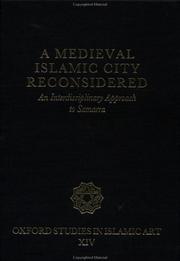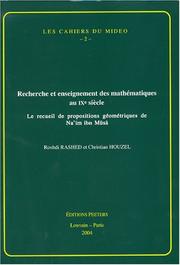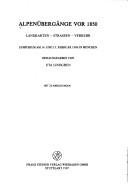| Listing 1 - 9 of 9 |
Sort by
|
Dissertation
Year: 1968 Publisher: [S.l.]: [s.n.],
Abstract | Keywords | Export | Availability | Bookmark
 Loading...
Loading...Choose an application
- Reference Manager
- EndNote
- RefWorks (Direct export to RefWorks)
Noblesse --- Rois et souverains --- Historiens allemands --- Allemagne --- Historiographie --- 9e siècle --- Histoire --- 10e siècle --- 11e siècle --- 843-1273
Dissertation
Year: 1989 Publisher: Liège : Université de Liège [ULg], Faculté de Philosophie et Lettres,
Abstract | Keywords | Export | Availability | Bookmark
 Loading...
Loading...Choose an application
- Reference Manager
- EndNote
- RefWorks (Direct export to RefWorks)
Book
ISBN: 9782503533797 2503533795 9782503537788 Year: 2010 Volume: 9 Publisher: Turnhout : Brepols,
Abstract | Keywords | Export | Availability | Bookmark
 Loading...
Loading...Choose an application
- Reference Manager
- EndNote
- RefWorks (Direct export to RefWorks)
Le colloque organisé à Lille et Amiens en 2006, à l'occasion du 1150e anniversaire de la mort de Raban Maur, complète une série de manifestations consacrées à trois personnalités majeures du haut Moyen Âge: de Bède le Vénérable (colloque de Lille et Amiens, 2002) à Alcuin (colloque de Tours, 2004) et à Raban qui devait à ce dernier son surnom de Maur, la filiation intellectuelle est manifeste. Celui que, depuis les temps modernes, on orne du titre de praeceptor Germaniae fut l'un des plus éminents personnages de la société carolingienne, par sa culture et par son rang: ce membre de l'aristocratie de la vallée du Main et du Rhin moyen enseigna à l'abbaye de Fulda, l'un des principaux foyers d'étude et des plus importants établissements monastiques du monde franc, dont il fut ensuite l'abbé (822-842) avant d'être promu archevêque de Mayence (847-856) et, par conséquent, premier prélat du royaume de Louis le Germanique.
Rabanus Maurus, --- Rabanus Maurus --- Criticism and interpretation --- Congresses --- Catholic Church --- Europe --- History --- Middle Ages, 500-1500 --- Hrabanus Maurus, --- Rhabanus Maurus ep. Moguntinus --- Rabanus Magnentius Maurus, --- Raban Maur, --- Rhabanus Maurus, --- Mauro, Rabano, --- Rabano Mauro, --- Einhard, Hraban, --- Hrabanus Magnentius, --- Rabanus, --- Criticism and interpretation. --- Raban Maur (0780-0856?) --- EUROPE --- VIE INTELLECTUELLE --- 07E-08E SIECLES --- Vie intellectuelle --- 9e siècle
Book
ISBN: 9782842874902 2842874900 Year: 2009 Volume: 1 Publisher: Limoges : Pulim,
Abstract | Keywords | Export | Availability | Bookmark
 Loading...
Loading...Choose an application
- Reference Manager
- EndNote
- RefWorks (Direct export to RefWorks)
Fonds Jean-Marie Duvosquel
Diplomatique --- --Louis, --- publication de sources --- --Franks --- Franks --- Francs --- History --- Histoire --- Ludwig, --- Louis --- Germany --- Allemagne --- Politique et gouvernement --- --Diplomatique --- 843-918 --- Sources --- Louis I, 814-840 --- --Germany --- Louis, 806-876 --- Actes royaux --- Empire carolingien --- 814-840 (Louis Ier) --- 9e siècle --- 9e siècle

ISBN: 0197280242 Year: 2001 Publisher: Oxford : Oxford University Press,
Abstract | Keywords | Export | Availability | Bookmark
 Loading...
Loading...Choose an application
- Reference Manager
- EndNote
- RefWorks (Direct export to RefWorks)
Islamic architecture --- Cities and towns, Medieval --- History. --- Sāmarrāʼ (Iraq) --- Architecture, Islamic --- -Cities and towns, Medieval --- -Medieval cities and towns --- Arab architecture --- Architecture, Arab --- Architecture, Moorish --- Architecture, Muslim --- Architecture, Saracenic --- Moorish architecture --- Muslim architecture --- Saracenic architecture --- Religious architecture --- History --- Samarra' (Iraq) --- -History --- Medieval cities and towns --- Sāmarrāʼ (Iraq) --- Sāmarrah (Iraq) --- Saimarreh (Iraq) --- Samarra (Irak)Samarra (Irak) --- 9e siècle --- 9e siècle

ISBN: 9042914963 2877238083 9789042914964 Year: 2004 Volume: 2 Publisher: Louvain : Peeters,
Abstract | Keywords | Export | Availability | Bookmark
 Loading...
Loading...Choose an application
- Reference Manager
- EndNote
- RefWorks (Direct export to RefWorks)
Geschiedenis van de wetenschappen --- Histoire des sciences --- Mathématiques --- Wiskunde --- Mathematics, Arab --- Mathematics, Medieval --- Geometry --- Mathematics, Arab. --- Mathematics, Medieval. --- Medieval mathematics --- Arab mathematics --- Mathematics, Arabic --- Mathematics, Greek --- Mathematics, Arab - Early works to 1800 --- Geometry - Early works to 1800 --- Ibn Mūsā , Naʿīm ibn Muḥammad (08..?-09..?) --- Mathématiques arabes --- Géométrie --- Critique et interprétation --- Ouvrages avant 1800 --- 9e siècle --- Ibn Mūsā , Naʿīm ibn Muḥammad (08..?-09..?) --- Mathématiques arabes --- Géométrie --- Critique et interprétation --- 9e siècle

ISBN: 3515028293 9783515028295 Year: 1978 Volume: 66 Publisher: Wiesbaden : Steiner,
Abstract | Keywords | Export | Availability | Bookmark
 Loading...
Loading...Choose an application
- Reference Manager
- EndNote
- RefWorks (Direct export to RefWorks)
Monastic and religious life --- History --- Abtei Prüm --- History. --- -#GROL:MEDO-930.85.42 --- Monastic life --- Spirituality (in religious orders, congregations, etc.) --- Monasticism and religious orders --- Spiritual life --- Vows --- -Christianity --- Abtei Prum --- -Prüm, Ger. --- Prüm (Germany). --- Kloster (Prüm, Germany) --- Benediktinerabtei (Prüm, Germany) --- -Abtei Prum --- -History --- #GROL:MEDO-930.85.42 --- Christianity --- Abtei Prüm --- Prüm, Ger. --- Germany --- Church history --- 843-1517 --- Agriculture --- Religious aspects --- Monastic and religious life - Germany - Prüm - History - Middle Ages, 600-1500. --- Kloster prüm --- Histoire sociale --- Abbayes --- 9e siècle --- Prüm (allemagne) --- Allemagne --- Rhénanie-palatinat (allemagne)
Book
ISSN: 09938699 ISBN: 9782910640217 2910640213 Year: 2007 Volume: 35 Publisher: Paris : Association pour l'avancement des études iraniennes,
Abstract | Keywords | Export | Availability | Bookmark
 Loading...
Loading...Choose an application
- Reference Manager
- EndNote
- RefWorks (Direct export to RefWorks)
Elite (Social sciences) --- Elite (Sciences sociales) --- History. --- Histoire --- Samarqand (Uzbekistan) --- S*amarr*a' (Iraq) --- Asia, Central --- Islamic Empire --- Samarkand (Ouzbékistan) --- Asie centrale --- Empire islamique --- History --- Social conditions --- Conditions sociales --- Abbasids --- Sāmarrāʼ (Iraq) --- History, Military --- Mamelouks --- Abbasids. --- Origines --- Abbassides (dynastie) --- Sāmarrāʾ (Iraq) --- History, Military. --- Socio-political and military history --- Central Asia --- 8th-9th centuries --- 8th-9th centuries. --- S*amarr*aʼ (Iraq) --- Samarkand (Ouzbékistan) --- Origines. --- Sāmarrāʼ (Iraq) --- Abbassides --- Elite (Social sciences) - Islamic Empire - History - To 1500 --- Elite (Social sciences) - Asia, Central - History - To 1500 --- Elite (Social sciences) - Iraq - Sāmarrāʼ - History - To 1500 --- Samarqand (Uzbekistan) - History --- Sāmarrāʼ (Iraq) - History --- Asia, Central - History --- Islamic Empire - History - 750-1258 --- Islamic Empire - History, Military --- Asia, Central - History, Military --- Élite (sciences sociales) --- Irak --- 8e siècle --- 9e siècle --- Élite (sciences sociales) --- 8e siècle --- 9e siècle
Book
ISBN: 9780801439292 0801439299 Year: 2010 Publisher: Ithaca (N.Y.) London : Cornell University Press,
Abstract | Keywords | Export | Availability | Bookmark
 Loading...
Loading...Choose an application
- Reference Manager
- EndNote
- RefWorks (Direct export to RefWorks)
"The Divorce of Lothar II illuminates the origin and development of Western notions of marriage and divorce and the separation of church and state in the context of a notorious royal divorce in late Carolingian Europe. In 857, Lothar II, king of Lotharingia, decided to divorce Theutberga - either because she had allegedly engaged in an incestuous liaison with her brother or simply because Lothar had wished to marry his concubine Waldrada. Karl Heidecker's dramatic and engaging narrative untangles the chaos that resulted: two popes, a host of often quarreling bishops, and Lothar's conniving uncles soon became involved in an epic struggle that did not end even with the death of Lothar. The extraordinary series of events sheds light on the fact that the laws on marriage and divorce were still uncertain, The Church itself was hardly unified in its approach, and its efforts to formulate and impose rules repeatedly foundered against the political machinations characteristic of the Carolingian world." "In The Divorce of Lothar II, Heidecker not only discusses the legal aspects of the case but also pays much attention to the often heavy-handed ways in which the players of the story achieved their goals. This ninth-century scandal becomes a study of family dynamics, changing values, and the tenuous relationships between kings, nobles, and bishops around the topic of royal marriage. Though the drama ended with no clear resolution of the Church's position, Lothar's quest is revealed as an early chapter in the emergence of the belief that marriage rests on the personal will of the partners, is monogamous, and should not be dissolved."--BOOK JACKET.
Divorce (Canon law) --- Marriage (Canon law) --- Divorce --- Mariage --- History --- Droit canonique --- Histoire --- Lothair --- Lorraine (France) --- France --- Kings and rulers --- Biography. --- History. --- Rois et souverains --- Biographies --- -944.015 --- 392.4/.5 "04/14" --- Marriage --- Broken homes --- Divorced people --- Sacraments (Canon law) --- Pauline privilege --- Privilegium Paulinum --- Canon law --- Separation (Canon law) --- Geschiedenis van Frankrijk: Karolingers--(751-987) --- Verloving. Huwelijk. Huwelijksgebruiken. Partnerkeuze. Polyandrie. Polygamie. Monogamie--Middeleeuwen --- Catholic Church --- Lothaire --- Lothar --- Lotharius --- -France --- -Kings and rulers --- -History --- -History. --- 392.4/.5 "04/14" Verloving. Huwelijk. Huwelijksgebruiken. Partnerkeuze. Polyandrie. Polygamie. Monogamie--Middeleeuwen --- 944.015 Geschiedenis van Frankrijk: Karolingers--(751-987) --- -Lothringen (France) --- Pʻŭrangsŭ --- Frankrig --- Francja --- Frant︠s︡ii︠a︡ --- Prantsusmaa --- Francia (Republic) --- Tsarfat --- Tsorfat --- Franḳraykh --- Frankreich --- Fa-kuo --- Faguo --- Франция --- French Republic --- République française --- Peurancih --- Frankryk --- Franse Republiek --- Francland --- Frencisc Cynewīse --- فرنسا --- Faransā --- Franza --- Republica Franzesa --- Gallia (Republic) --- Hyãsia --- Phransiya --- Fransa --- Fransa Respublikası --- Franse --- Францыя --- Frantsyi︠a︡ --- Французская Рэспубліка --- Frantsuzskai︠a︡ Rėspublika --- Parancis --- Pransya --- Franis --- Francuska --- Republika Francuska --- Bro-C'hall --- Френска република --- Frenska republika --- França --- República Francesa --- Pransiya --- Republikang Pranses --- Γαλλία --- Gallia --- Γαλλική Δημοκρατία --- Gallikē Dēmokratia --- فرانسه --- Farānsah --- צרפת --- רפובליקה הצרפתית --- Republiḳah ha-Tsarfatit --- פראנקרייך --- 法国 --- 法蘭西共和國 --- Falanxi Gongheguo --- フランス --- Furansu --- フランス共和国 --- Furansu Kyōwakoku --- Francija --- Ranska --- Frankrike --- 944.015 --- Lothringen (France) --- Alsace-Lorraine (Germany) --- Lorraine (Duchy) --- Bar (Duchy) --- Lorraine (Territory under German Occupation, 1940-1944) --- Grand Est (France) --- Lothaire II (roi de Lotharingie ; 0835?-0869) --- Carolingiens (dynastie) --- Mariages royaux et nobles --- Moeurs et coutumes --- 9e siècle --- 9e siècle
| Listing 1 - 9 of 9 |
Sort by
|

 Search
Search Feedback
Feedback About UniCat
About UniCat  Help
Help News
News